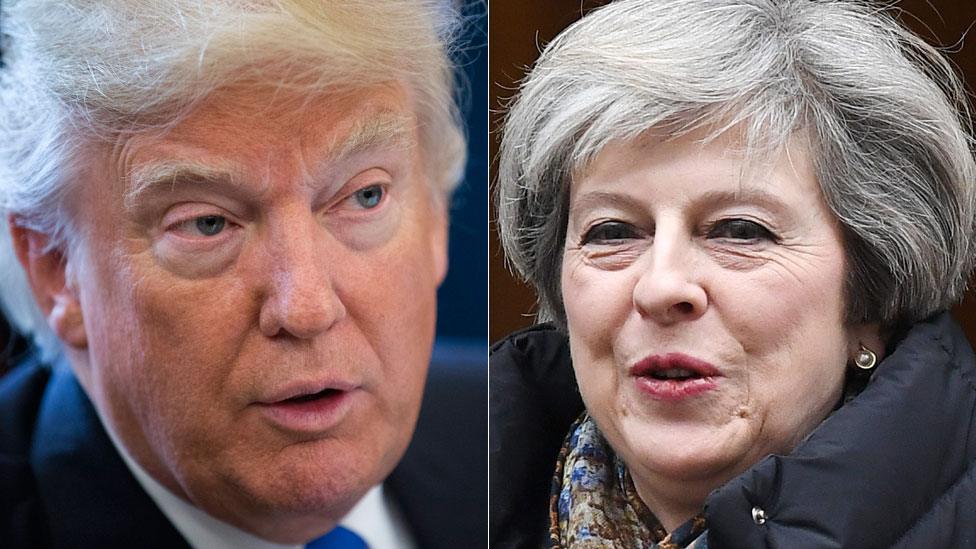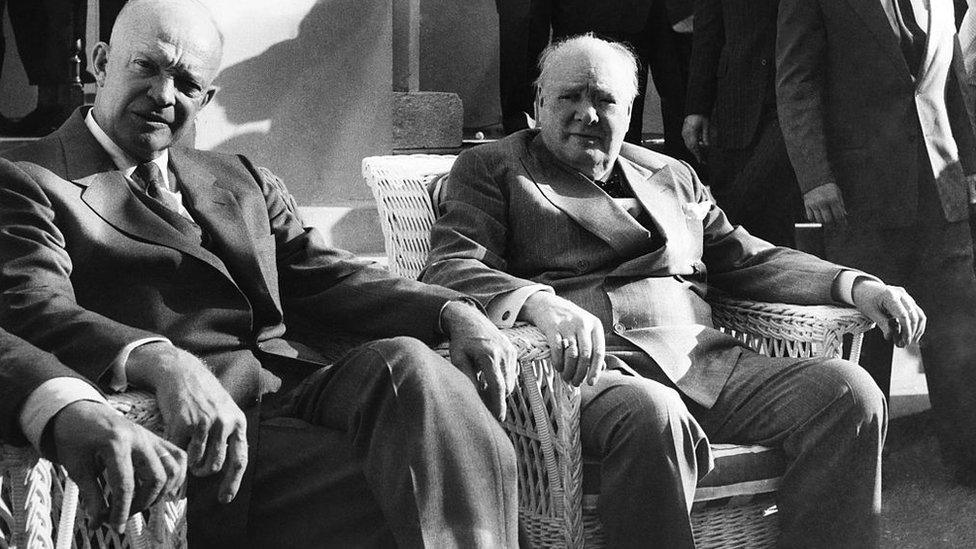First meetings: US presidents and UK prime ministers
- Published

Theresa May is preparing to meet new US President Donald Trump. Here's a look back at some first encounters of UK prime ministers and new US presidents:

Gordon Brown and Barack Obama - 3 March 2009
Gordon Brown's first meeting with Barack Obama came amid a global economic crisis
The election of Barack Obama came at the tail end of the Labour government.
Embroiled in both economic and political crisis, Gordon Brown spotted President Obama's election as an opportunity to be touched by the gold dust of the newly elected president.
In March 2009, Downing Street proudly boasted that Mr Brown was the first European leader President Obama had met.
The first meeting was dominated by the global financial crisis and the upcoming G20 summit in London.
However, there was some embarrassment when President Obama gifted a box of US films to Brown - on DVDs that did not work on UK players.

Tony Blair and George W Bush - 23 February 2001
The two leaders went on to form a close bond
Tony Blair and George W Bush's first summit came at a snowy Camp David - the US president's official retreat - seven months before the 9/11 attacks that would come to define their relationship.
The two leaders would eventually form a tight bond, with both countries going to war in Iraq despite the opposition of some European allies.
But the Camp David summit is remembered for something rather more trivial.
Upon being asked what the two leaders had in common, President Bush replied: "Well, we both use Colgate toothpaste."

John Major and Bill Clinton - 24 February 1993
There were trade tensions between Europe and the US when the two leaders met
The first encounter between John Major and Bill Clinton was just a month after the president's inauguration.
There was a certain degree of nervousness before the meeting.
Mr Major had been a ferocious backer of George H W Bush in the 1992 presidential election.
And between 1993 and 1997, the relationship between Mr Major and Mr Clinton never really blossomed.
They fell out over the US issuing a visa to Sinn Fein's Gerry Adams and the brewing conflict in the Balkans.
There are shades of the present-day debate in the BBC's Martin Sixmith's report, as he says trade tensions between the European Community and the USA, and accusations of protectionism, are a "cloud" over Mr Major's visit.

Margaret Thatcher and George H W Bush - 7 November 1988
Margaret Thatcher meets incoming president George Bush
Margaret Thatcher and president-elect George H W Bush's first official visit took place during her trip to Washington DC in November 1988.
The visit was planned before the election to say goodbye to her ally Ronald Reagan, and the BBC report at the time wondered whether her relationship with President Bush could be "as special".
She spent some time with the incoming president to discuss the end of the Cold War and the tensions in the Gulf.
A year after she left Downing Street, President Bush invited Thatcher back to the White House to receive the Presidential Medal of Freedom, the highest civilian award of the United States.

Margaret Thatcher and Ronald Reagan - 25 February 1981
Margaret Thatcher had a close relationship with Ronald Reagan
When Margaret Thatcher met President Reagan just a month into his presidency, they weren't strangers - their first meeting took place in 1975, when he was the former governor of California and she was leader of the UK opposition.
In 1981, the British economy was entering its sixth quarter of recession, and her government seemed on course for electoral defeat.
At her lowest point, no-one placed themselves by her side as much as the incoming president of the United States, who made her his administration's first visitor and treated her with a warm welcome, in stark contrast to the frugality of his predecessor, Jimmy Carter.
Margaret Thatcher and Ronald Reagan became political soulmates and good friends.
"Your problems," said the British prime minister, "will be our problems, and when you look for friends, we shall be there."

James Callaghan and Jimmy Carter - 10 March 1977
James Callaghan flew to Washington to meet new US president Jimmy Carter
James Callaghan's arrival in Washington - on Concorde - came amid an ongoing siege nearby, which led to the cancellation of the traditional 19-gun salute in case it alarmed the gunman.
But there was still "a very relaxed feeling" about the ceremony, the BBC reported.
President Jimmy Carter hailed the special relationship between the two nations, while James Callaghan said "concerted intergovernmental action" was needed for the global economy to emerge from recession.
He promised a "very warm welcome" when the US president visited London.

Harold Wilson and Richard Nixon - 27 February 1969
Harold Wilson meets new US President Richard Nixon in 1969
The Labour prime minister and the Republican president were poles apart, both politically and in their approach.
Richard Nixon recoiled from Harold Wilson's suggestion, made at their first meeting in London in February 1969, that the two men use each other's first names.
Another incident had ratcheted up the tension.
Before the 1968 election, when Mr Nixon was expected to lose to vice-president Hubert Humphrey, Mr Wilson appointed his old ally John Freeman as ambassador in Washington.
Unfortunately, Mr Freeman had once described Mr Nixon as a "man of no principle", and the president was not best pleased.
Mr Freeman offered to resign, but Mr Wilson said he should stay.
Fortunately, at a banquet on his visit to Britain, Mr Nixon greeted the ambassador with generosity.
Mr Wilson wrote the president a note thanking him for "one of the kindest and most generous acts I have known in a quarter of a century in politics".
On his trip to Britain, Mr Nixon also visited ministers in Downing Street and came for one-on-one talks at Chequers.
The president enjoyed his visit, and was soon writing notes to "Dear Harold" and signing them off "Dick Nixon".

Harold MacMillan and John F Kennedy - 4 April 1961
Harold Macmillan meets John F Kennedy in 1961
After their first meeting, in April 1961 Prime Minister Harold Macmillan and President John F Kennedy were close allies, despite the stark contrast between the ageing British patrician and the glamorous president 23 years his junior.
Harold Macmillan was said to have a very real and lasting affection for a man who was of the same generation as his own son, Maurice.
According to his biographer, Macmillan watched JFK on the national stage with "a combination of nervousness and pride an accomplished actor might feel for a mercurial young protege stepping up to take his first starring role in public".

Winston Churchill and Dwight Eisenhower - 5 January 1953

Winston Churchill and Dwight Eisenhower, seen together in Bermuda in 1953
Winston Churchill arrived in New York to a rapturous reception.
He met President-elect Dwight Eisenhower at the apartment of Bernard Baruch, a wealthy businessman, on two separate occasions in the weeks before the inauguration.
They came from different backgrounds, Mr Eisenhower, a Kansas boy, born in a shack beside the railroad tracks in rural Texas, and Mr Churchill, a British aristocrat, born in Blenheim Palace.
Yet they had a friendship that was forged in the darkest periods of World War Two and lasted until Churchill's death in 1965.